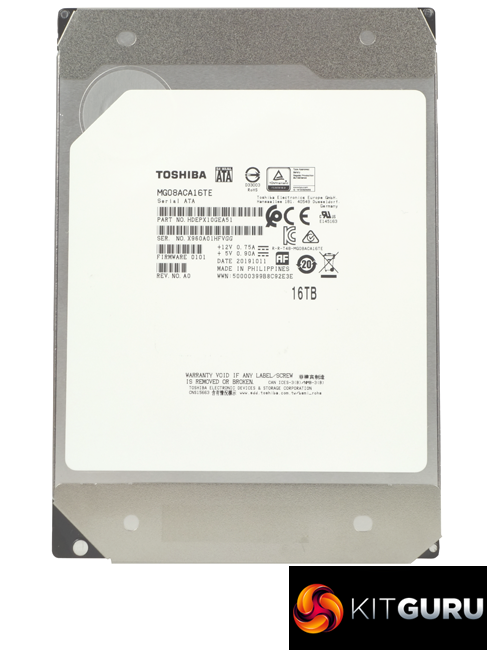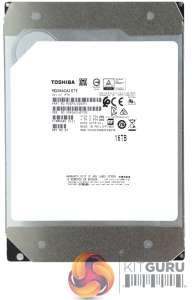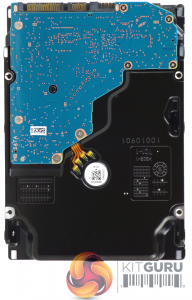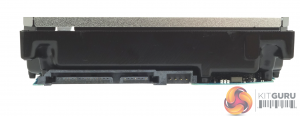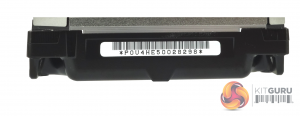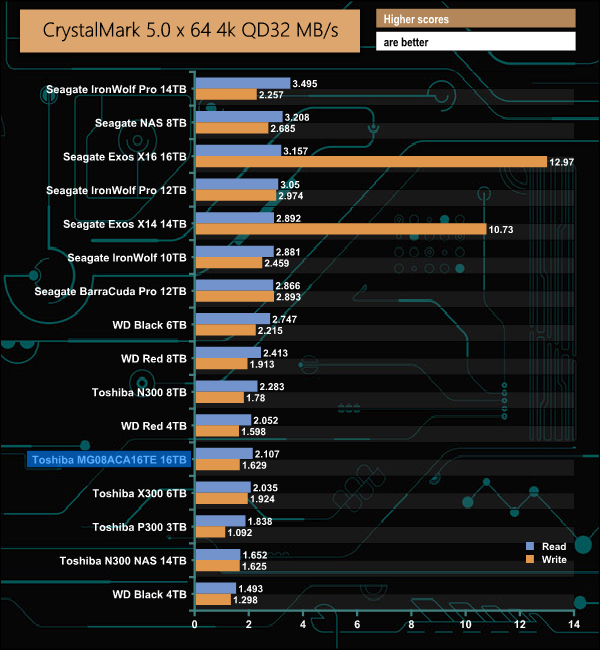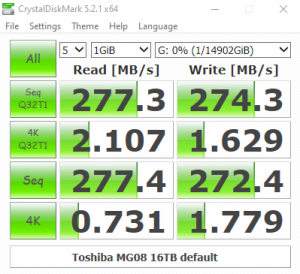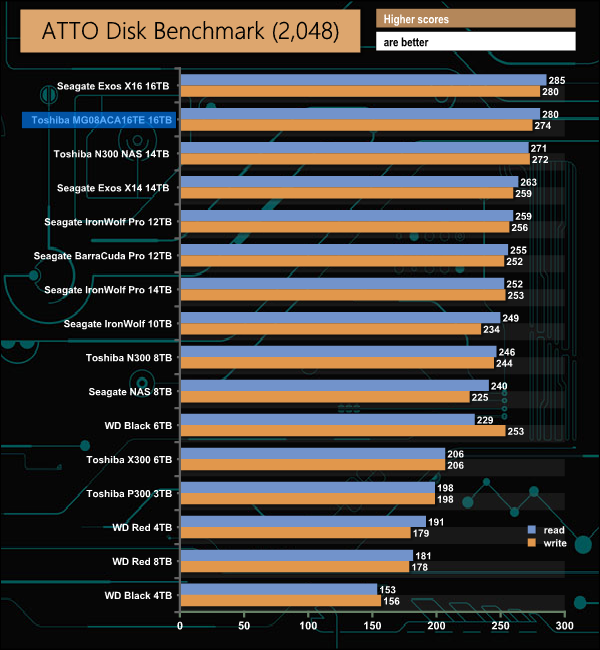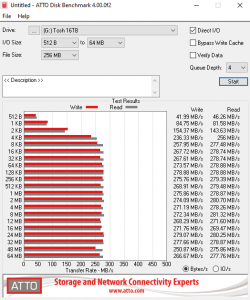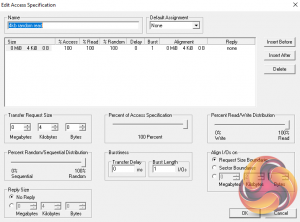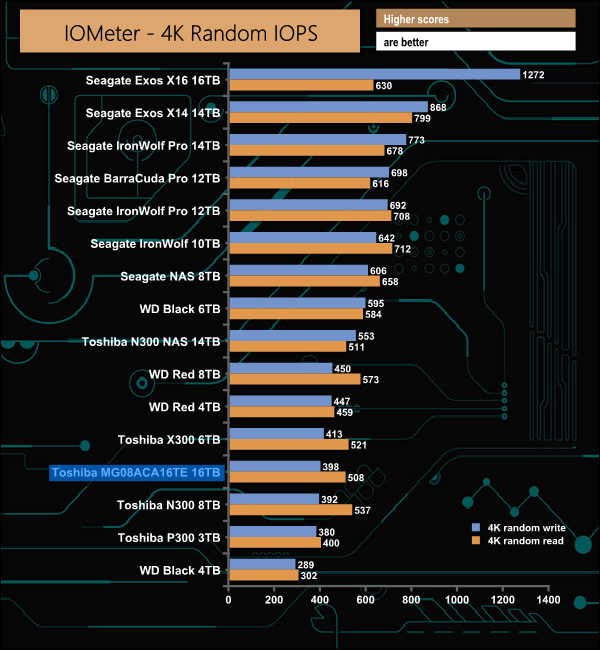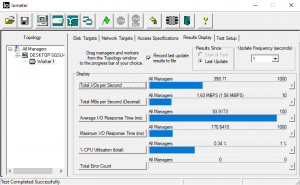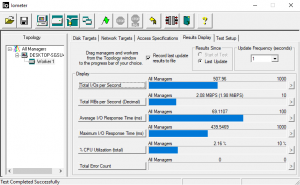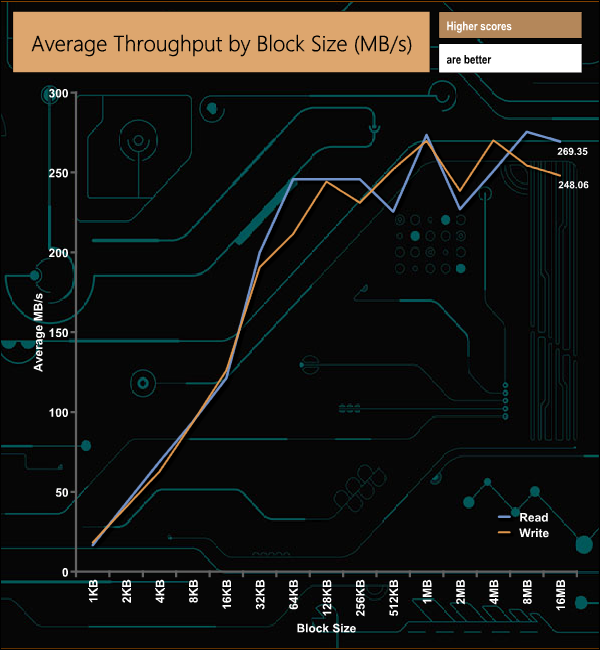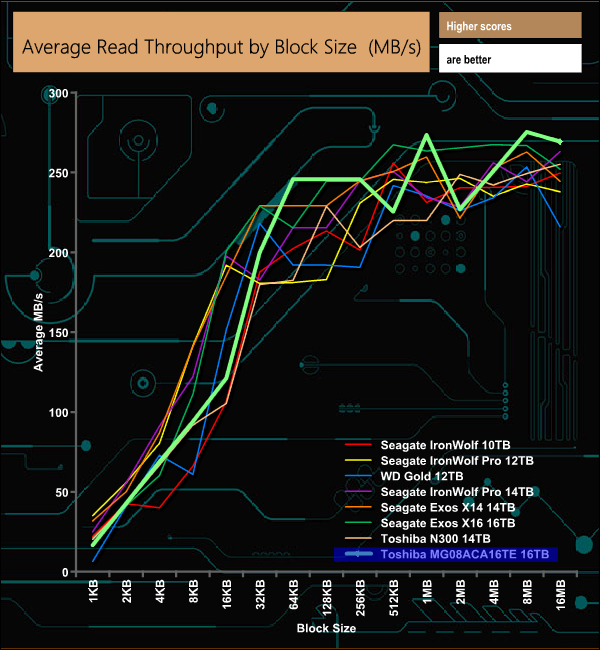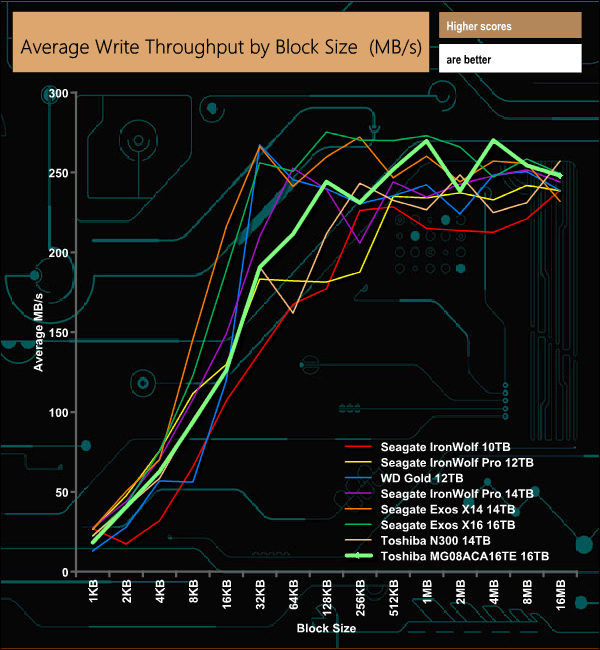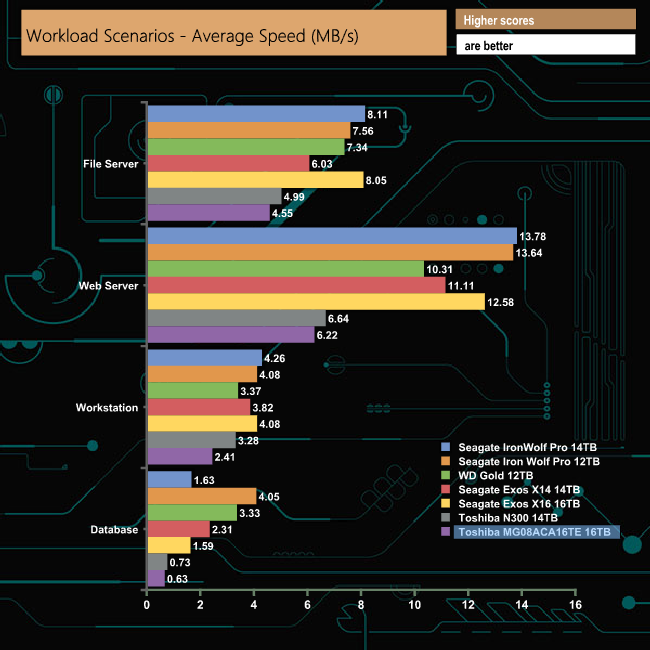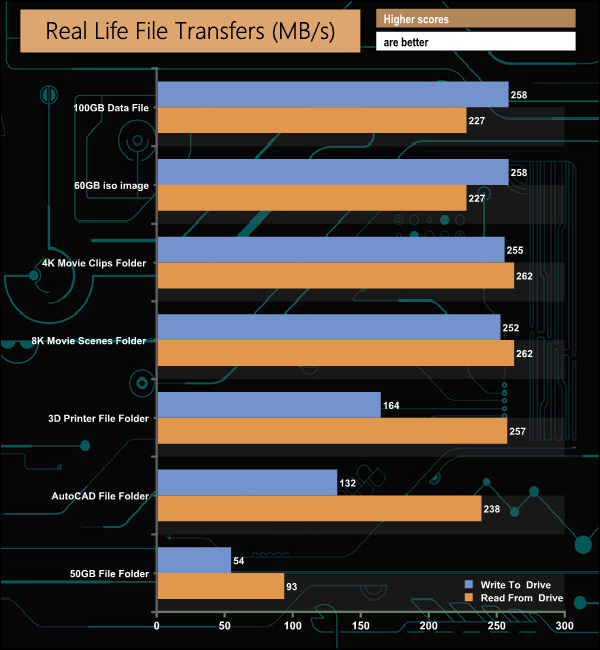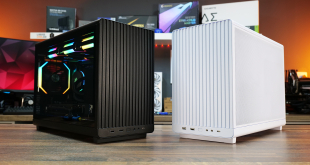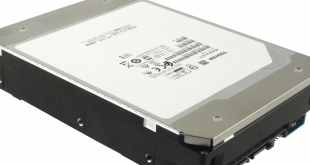
Designed to meet the ever-growing need for storage densities in the enterprise environment, the eighth-generation MG08 drives from Toshiba are also the company's second-generation helium-sealed HDD drives. The 16TB drives are available in a number of versions with a choice of two interfaces.
The 16TB MG08 series uses Helium technology which allows for 9 x 1.8TB (approx.) CMR (conventional magnetic recording) platters together with 18 TDMR heads to be crammed into a 3.5in format drive with a height of just 26.1mm. The drive has a spindle speed of 7,200rpm and is equipped with 512MB of cache. The official transfer rate for the MG08 series is up to 262MB/s.
The MG08 is available in a variety of versions. First, off it comes with either 6Gb/s SATA or 12Gb/s SAS interfaces. Then there are 512e or 4Kn Advanced Format Sector Technology options and finally, there are four SED (Self-Encrypting Drive) versions. The 512e models include Toshiba Persistent Write Cache Technology that offers protection against loss of data in sudden power-loss events.
There are four SATA models, two standard versions MG08ACA16TA (4Kn) and MG08ACA16TE (512e, the drive we are reviewing here) and two SED versions (4Kn MG08ACP16TA, 512e MG08ACP16TE).
The four 12Gb/s SAS models are; MG08SCA16TA (standard 4Kn), MG08SCP16TA (4Kn SED), MG08SCA16TE (standard 512e) and MG08SCP16TE (512e SED).
Power ratings for the SATA versions of the drive are quoted as 4W average idle with maximum 4K read/write power figures of 7.63W. Toshiba quote a workload rating of 550TB/year with an MTBF of 2.5M hours and back the drive with a 5-year warranty.
Physical Specifications:
- Usable Capacities: 16TB.
- Spindle Speed: 7,200rpm.
- No. Of Heads: 18 (TDMR – Two-Dimensional Magnetic Recording).
- No. Of Platters: 9.
- Cache: 512MB.
- Recording Method: Conventional Magnetic Recording (CMR).
- Interface: Serial ATA (SATA) 6Gb/s (SATA III).
- Form Factor: 3.5in.
- Dimensions: 101.85 x 26.1 x 147.0mm.
- Drive Weight: 720g.
Firmware Version: 0101.
Our review sample MG08ACA16TE didn't come in a retail box, which is hardly surprising as it's aimed at the enterprise segment. The MG08 is built on a standard 3.5in format with an enclosure thickness of 26.11mm. The drive has a spindle speed of 7,200rpm and 512MB of cache.
Alongside the Helium technology, the MG08 also employs TDMR (Two-Dimensional Magnetic Recording) technology. TDMR technology has come about because as the areal density of hard drive platters (discs) increases, tracks get ever narrower and as a result, magnetic inter-track interference (ITI) becomes problematic for the writer part of the drive head. Whereas conventional hard drives use a single reader and writer per head, TDMR uses two or more heads to read data from a single or even several nearby tracks at the same time to improve the signal-to-noise ratio delivered to the controller.
For testing, the drives are all wiped and reset to factory settings by HDDerase V4. We try to use free or easily available programs and some real-world testing so you can compare our findings against your own system.
This is a good way to measure potential upgrade benefits.
Main system:
Intel Core i7-7700K with 16GB of DDR4-3200 RAM, Sapphire R9 390 Nitro and an Asus Prime Z270-A motherboard.
Other drives
- Seagate NAS 8TB
- Seagate Exos X16 16TB
- Seagate Exos X14 14TB
- Seagate IronWolf Pro 14TB
- Seagate BarraCuda Pro 12TB
- Seagate IronWolf Pro 12TB
- Seagate IronWolf 10TB
- Toshiba N300 8TB
- Toshiba NAS N300 14TB
- Toshiba P300 3TB
- Toshiba X300 6TB
- WD Gold 12TB
- WD Black 6TB
- WD Black 4TB
- WD Red 4TB
- WD Red 8TB
Software:
Atto Disk Benchmark.
CrystalMark 5.
IOMeter.
CrystalDiskMark is a useful benchmark to measure theoretical performance levels of hard drives and SSDs. We are using V5 to test HDD drives.
Our review sample MG08ACA16TE didn’t handle the CrystalDiskMark 4K tests particularly well, in fact it was a little slower than the 8TB version of the Toshiba N300 we’ve reviewed previously, but on the other hand it was faster than the 14TB N300 NAS.
The ATTO Disk Benchmark performance measurement tool is compatible with Microsoft Windows. Measure your storage systems performance with various transfer sizes and test lengths for reads and writes. Several options are available to customize your performance measurement including queue depth, overlapped I/O and even a comparison mode with the option to run continuously.
Use ATTO Disk Benchmark to test any manufacturers RAID controllers, storage controllers, host adapters, hard drives and SSD drives and notice that ATTO products will consistently provide the highest level of performance to your storage.
The official Sequential read/write rating for the MG08 range is up to 262MB/s. With the ATTO benchmark, we were able to better those figures, with the review drive producing a read figure of 280MB/s with writes at 274MB/s.
IOMeter is another open-source synthetic benchmarking tool which is able to simulate the various loads placed on a hard drive and solid-state drive technology.
We test with both random read and write 4K tests, as shown above. There are many ways to measure the IOPS performance of a hard drive, so our results will sometimes differ from the manufacturer’s quoted ratings. We do test all drives in exactly the same way, so the results are directly comparable.
As with the CrystalDiskMark 4K tests, the drive seemed to struggle in our 4K random read/write tests particularly when it came to writes. It was slower than the last large capacity Toshiba drive we looked at, the 14TB N300 NAS, by quite some margin when it came to write performance.
The official maximum transfer speed for the MG08 is up to 262MB/s. In our throughput tests, we saw a little better peak performance than that, with reads peaking at 275MB/s (8MB block size) with writes peaking earlier in the test (4MB block) at 270MB/s.
We tested the MG08 with a number of scenarios that it may face in the real world. The settings for these scenarios are as follows.
File Server
512MB file size, 16KB Block size
80% Read 20% Write 100% Random
I/O queue depth 128
Web Server
1GB file size, 16KB Block size
100% Read 0% Write 100% Random
I/O queue depth 64
Database
2GB file size, 4KB Block size
90% Read 10% Write, 90% Random, 10% Sequential
I/O depth 128
Workstation
1GB file size, 16KB Block Size
70% Read 30% Write 50% Random 50% Sequential
I/O depth 64
Although the MG08ACA16TE is the slowest drive compared to the others in our workload tests, the gap between it and the rest in the File Server, Web Server and Database tests is pretty minimal. The biggest difference came in the Workstation test where the MG08 lagged behind all the other drives.
To test the real-life performance of a drive we use a mix of folder/file types and by using the FastCopy utility (which gives a time as well as MB/s result) we record the performance of drive reading from & writing to a 256GB Samsung SSD850 PRO.
We use the following folder/file types:
- 100GB file
- 60GB iso image
- 50GB File folder – 28,523 files.
- 3D Printer file folder.
- AutoCAD File folder.
- 4K Movie Clip folder.
- 8K Movie Scenes folder.
The MG08ACA16TE had no problems dealing with any of our real-life file transfers apart from the 50GB File Folder transfer, although to be fair to the drive, this is the one test that nearly all drives slow down for.
The demands for data storage are growing at an ever-faster pace and showing no signs of slowing down, especially when it comes to cloud-based services, content serving and digital archiving. While Flash-based storage now holds sway over solutions that were once the stronghold of mechanical drives, the one area where good old spinning disks still reign supreme is in the storage of “cold” and archival data where cost per GB is a more important factor than ultimate performance.
Toshiba's eighth-generation enterprise drive series, the MG08, have been designed to meet this ever-increasing desire for capacity. Their 16TB size offers 33% more capacity than 12TB drives and 14% more than 14TB models while maintaining the same footprint.
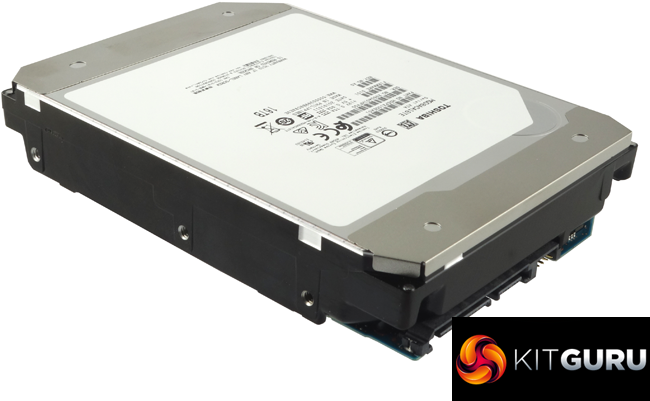
Needless to say, Toshiba has used Helium technology in the MG08 series, making them the second-generation of helium-sealed Toshiba HDD drives. Helium technology has allowed drive manufacturers to produce larger capacity drives thanks to its property of being 1/7th the density of air, reducing the internal turbulence and friction on the platters, actuating arms and heads. The reduction of turbulence inside the enclosure means that more platters and heads can be built in the same internal space.
Another benefit of the reduced friction is lower thermals and power consumption, so not only are these disks much larger than previous generations, but they are also cheaper to run per gigabyte of storage in power consumption terms, a very important attribute in the environments they are aimed at.
The MG08 is available in a variety of versions. First, off it comes with either 6Gb/s SATA or 12Gb/s SAS interfaces. Then there are 512e or 4Kn Advanced Format Sector Technology options and finally, there are four SED (Self-Encrypting Drive) versions. The 512e models include Toshiba Persistent Write Cache Technology that offers protection against loss of data in sudden power-loss events. There is also an SIE (Sanitize Instant Erase) model available.
There are four SATA models, two standard drives, the MG08ACA16TA (4Kn) and MG08ACA16TE (512e, the drive we are reviewing here) and a pair of SED versions (4Kn MG08ACP16TA, 512e MG08ACP16TE).
In the 12Gb/s SAS range, again there are four models. The standard drives are the MG08SCA16TA (4Kn) and MG08SCA16TE (512e) while the MG08SCP16TA (4Kn) and the MG08SCP16TE (512e) are SED drives.
As with any modern hard drive for business and/or enterprise use, the MG08 drives use a range of technologies to protect it and the data it holds. Toshiba's Stable Platter technology utilises a tied spindle motor to stabilise the motor drive shaft at both ends to protect against system-induced vibration and to this end, the drives also have multiple sensors inside the drive to monitor, detect and compensate for RV (Rotational Vibration) and other forms of shock that the drive might encounter. The 512e versions of the drives come with Toshiba Persistent Write Cache Technology, that offers protection against loss of data in sudden power-loss events.
We found the MG08ACA16TE version of the MG08 for £488.80 (inc VAT) on Span.com HERE.
Pros
- Fast Sequential performance.
- Choice of formats and interfaces.
Cons
- 4K performance is not as good as some of the competition.
KitGuru says: Toshiba's eighth-generation enterprise drive performs well and for the IT manager, the range of formats and interfaces offered by the MG08 series give it a good deal of flexibility when it comes to deployment.
 KitGuru KitGuru.net – Tech News | Hardware News | Hardware Reviews | IOS | Mobile | Gaming | Graphics Cards
KitGuru KitGuru.net – Tech News | Hardware News | Hardware Reviews | IOS | Mobile | Gaming | Graphics Cards


